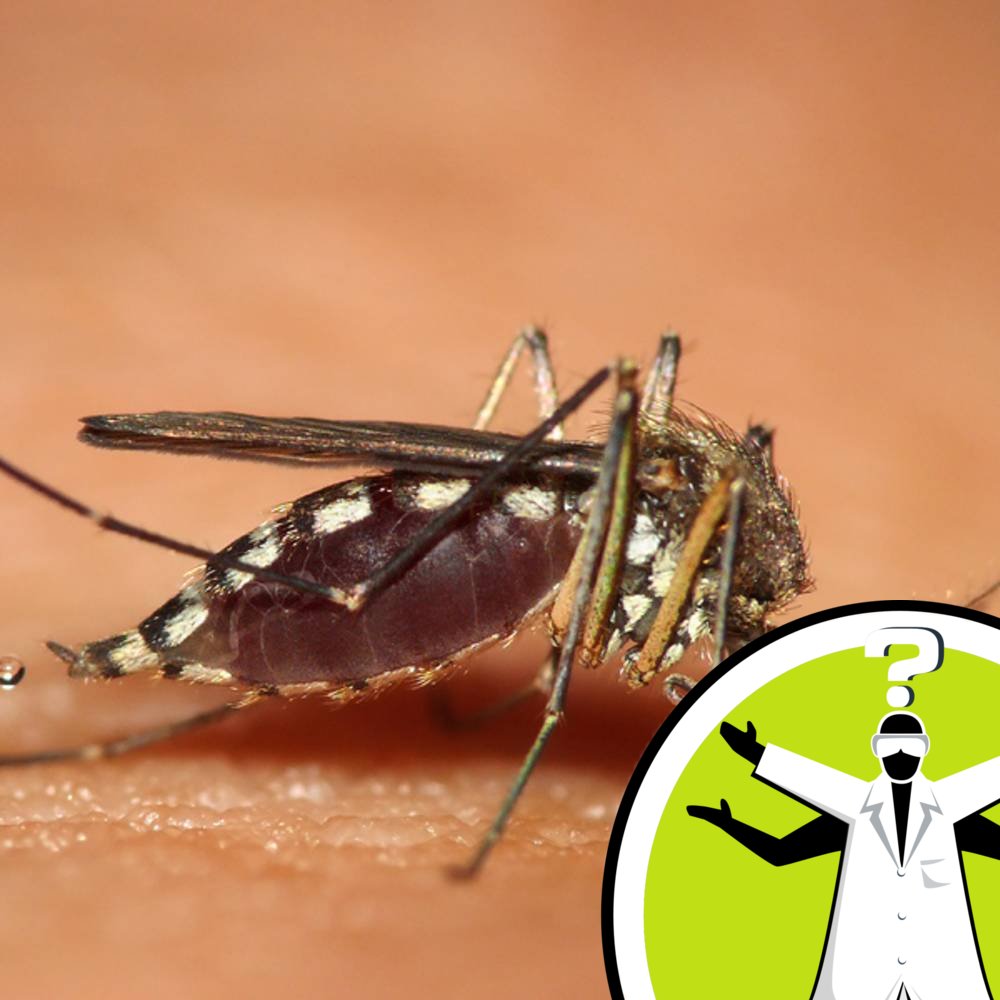
Question of the Week, from the Naked Scientists
Each week we set out to solve one of the world's weirdest, wackiest, funniest and funkiest scientific puzzles. And along with the answer there's a brand new question to think about for next time...
- Update frequency
- every 6 days
- Average duration
- 4 minutes
- Episodes
- 629
- Years Active
- 2008 - 2025

How smart is your pet dog?
David wanted to know how our pet dogs compare to other animals, such as primates and dolphins, when it comes to intelligence. Stevie Bain spoke to Ben Ambridge from the University of Liverpool, and a…
00:03:22 |
Sun 17 Sep 2017

Why Do Clothes Dry Below 100 Degrees Celsius?
This week, we aired out Norm's question: if water is a solid, as ice, below 0 degrees Celsius, a gas above 100 degrees Celcius and a liquid between this range, why does washing dry when the air tempe…
00:04:25 |
Sun 10 Sep 2017

Could green humans harvest energy from the sun?
This week, Mark has a conundrum about chloroplasts: If we could go green and harvest energy from the sun, like plants, how big would our skin need to be to sustain a normal level of activity? Georgia…
00:04:24 |
Sun 20 Aug 2017

Does washing dishes leave toxic detergent residue on plates?
Caitlin asked whether detergent residues left on crockery and cutlery could be bad for our health. Katie Haylor spoke to Rob Chilcott from the University of Hertfordshire to find out. Like this podca…
00:04:43 |
Sun 13 Aug 2017

Can Anti-Noise Silence A Highway?
Is it possible to create noise-cancelling headphones, but for an apartment? Like this podcast? Please help us by supporting the Naked Scientists
00:03:57 |
Sun 25 Jun 2017

Why Warm up Muscles?
Jim asked whether being in a warm room - like in a hot yoga class - really does help your muscles to warm up quicker. Katie Haylor spoke to Christof Schweining from the University of Cambridge to fin…
00:03:48 |
Sun 11 Jun 2017

Can we exercise our brain to improve at difficult tasks?
Like physical activity, can we exercise our brain to improve at difficult mental challenges? Izzie Clarke spoke to Duncan Astle from Cambridge University about this tiring task... Like this podcast? …
00:04:00 |
Sun 14 May 2017

Why do musical instruments sound different when playing the same note?
Why does the same musical note sound different when played on different instruments? Why does, for example, an A-sharp on a piano sound different to an A-sharp on a trumpet? Like this podcast? Please…
00:04:26 |
Sun 07 May 2017

What sound does a falling missile make?
Listener George wondered why, in films, missiles make a descending sound as they fall? And what would it sound like if it fell into a bottomless pit? Izzie Clarke asked Peter Main from King's College…
00:03:52 |
Sun 23 Apr 2017

Why are blue lights harder to see?
David wanted to know why the blue lights he saw in Christmas trees were often harder to make out. Izzie Clarke spoke to Dr George Dobre from Kent University to shed some light on the issue. Like this…
00:03:46 |
Sun 23 Apr 2017

Whats the most efficient way to run up steps?
We investigate the most energy-efficient way to climb stairs: one or two at a time? Like this podcast? Please help us by supporting the Naked Scientists
00:04:15 |
Sun 26 Mar 2017

Can mosquitoes transmit HIV?
Can mosquitoes transmit HIV from one person to another? Ricky Nathvani investigates... Like this podcast? Please help us by supporting the Naked Scientists
00:04:18 |
Mon 20 Mar 2017

When should I replace my bulbs with LEDs?
Ricky Navthani has been trying to shed some light of Philip's question, about when he should replace his old CFL lights for more efficient LEDs. Like this podcast? Please help us by supporting the Na…
00:03:42 |
Mon 13 Mar 2017

How Does My Tea Become Pee?
When you drink tea and use the toilet shortly afterwards, is that the same liquid? Like this podcast? Please help us by supporting the Naked Scientists
00:03:26 |
Mon 27 Feb 2017

Could we see into the past?
Listener David got in touch to ask about whether mirrors in space could show us what Earth was like a million years ago. Graihagh Jackson asked Cambridge's Anna Hourihane to explain how this might wo…
00:03:31 |
Mon 20 Feb 2017

How did birds survive the dinosaur mass extinction?
If birds are dinosaurs, why didn't they get killed by the asteroid 60 million years ago? Tom O'Hanlon put Fay's query to David Norman from the University of Cambridge. Like this podcast? Please help …
00:03:21 |
Mon 13 Feb 2017

Why are the poles north-south?
Listener Tim got in touch to ask: Why do the poles go north-south as opposed to east-west? Graihagh Jackson spoke to Imperial College's Stuart Higgins to find out... Like this podcast? Please help us…
00:03:25 |
Tue 24 Jan 2017

Do Ants Feel Pain?
Do ants or other insects feel pain in the same way as humans do? And what does it have to do with robots? Tom Crawford gets some ant-sight from the University of York's Eleanor Drinkwater... Like thi…
00:04:13 |
Mon 23 Jan 2017

What Would Peeing on the Moon Look Like?
What would peeing on the moon look like? Is it even possible? Tom Crawford puts this astronomical question to Dr. Chris Messenger from the University of Glasgow... Like this podcast? Please help us b…
00:05:18 |
Mon 16 Jan 2017

Why doesn't water burn?
Water contains hydrogen and oxygen, both of which are important in combustion, so why is it used to put out fires? Why doesn't water burn? Graihagh Jackson put this to chemist Peter Wothers from the …
00:04:41 |
Mon 05 Dec 2016
Disclaimer: The podcast and artwork embedded on this page are the property of Dr Chris Smith. This content is not affiliated with or endorsed by eachpod.com.